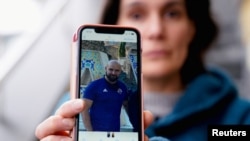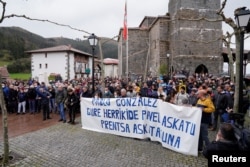A Spanish war reporter who is accused of spying for Russia must stay for three more months in pre-trial detention without access to his family or a lawyer, a Polish court ruled this week.
Pablo González, who has joint Spanish-Russian nationality, has been held in a Polish prison about 400 km from Warsaw since February on charges that he spied for Russia. He denies the allegations.
A court in Poland ruled Wednesday that González must remain in custody for a second three-month period. Under Polish law, he could be held for up to a year. If convicted of spying charges, he could be jailed for up to 10 years.
His Spanish lawyer, Gonzalo Boye, has said that access to the prosecution case file is being limited.
International media rights organizations have protested the treatment of González, who has reported from Ukraine, Syria and other conflict zones.
Gonzalez did some camera work for VOA in 2020 and 2021.
"Out of an abundance of caution VOA removed some of the content filed by Gonzalez for review," VOA said in a statement.
The Global Network for Independent Media tweeted: "This decision to extend pre-trial detention of Spanish journalist @PabVis is deeply problematic. IPI urges Polish authorities to act in a more transparent manner and provide immediate justification for the decision."
The organization said the detention of González had been characterized by a "lack of transparency and lack of access to legal support."
In Spain, a campaign led by friends, journalists and television presenters has started. Called #FreePabloGonzález, it demands that Poland drop the charges and release the journalist from custody.
More than 30,000 people have signed a petition calling for his release.
Spanish Prime Minister Pedro Sánchez told the country's parliament last month that the foreign minister had been in contact with his Polish counterpart over González's case.
Poland's secret service claims he used his role as a journalist as a cover for espionage, but officials have not publicly disclosed any supporting evidence.
González will deny this claim, Boye said. Although his family has links to Russia because his father moved there as a child after the Spanish Civil War, González is not part of Russian President Vladimir Putin's secret service, Boye said.
"Pablo has not been allowed any contact with his family nor his lawyer. The Spanish consul has seen him four times," Boye told VOA. "He is being held with one other man in a cell. He is no longer in solitary confinement. He is OK, but he is missing his family."
The news that González would have to stay at least three more months in prison was tough for his family, his wife, Oihana Goiriena, told VOA.
"Until now, our three boys, who are aged 14, 10 and 7, have taken it well because they are used to their father being away for work," she said from their home in a village in the Basque country of northern Spain.
"But when I had to tell them that he was not coming home, they were very depressed. He has already missed two of the boys' birthdays — and his own. It was his 40th birthday, and he was in a prison cell."
González was arrested on February 28 when crossing from Poland into Ukraine, where he had been reporting the start of the Russian invasion.
Earlier, he had been detained by Ukrainian secret service officials and accused of spying for Russia, which he denied. He returned to Spain for a few days before leaving for Poland.
A spokesman for Spain's Foreign Ministry told VOA, "We have afforded González consular help."
The Spanish Defense Ministry, which has responsibility for the intelligence services, declined to comment on the matter.
VOA asked the Polish Embassy in Madrid for comment on the case but received no response.





